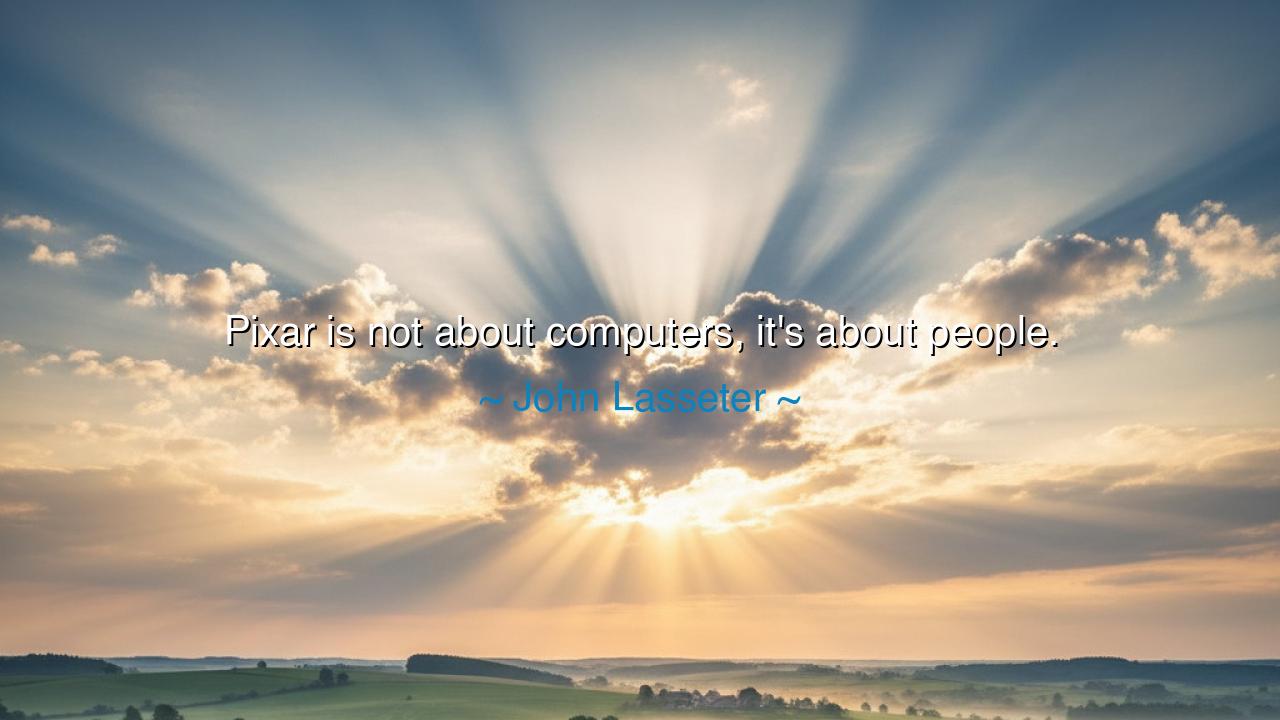
Pixar is not about computers, it's about people.






The visionary storyteller John Lasseter, co-founder of Pixar, once declared with the simplicity of truth itself: “Pixar is not about computers, it’s about people.” Though spoken in an age of dazzling technology and boundless digital craft, these words are not about machines at all—they are about heart. In this brief statement lies the eternal law of creation: that no matter how advanced the tool, no matter how powerful the invention, it is the human spirit behind it that breathes life into art. Lasseter, a master of modern myth, saw that the true magic of Pixar did not dwell in its computers, but in the storytellers who used them to touch the human soul.
In the world of ancient craftsmen, the chisel was never worshiped—the sculptor was. For marble without a hand is only stone, and a lute without a player is silent wood. So too, in the realm of digital creation, the computer is but the chisel of our age. It can model, render, and simulate, but it cannot dream. Dreaming is the gift of humankind, the fire that no machine can kindle on its own. Lasseter’s words remind us that while technology can build the stage, only people can fill it with meaning.
The origin of this wisdom lies in Pixar’s own story—a tale born not of machinery, but of courage, vision, and trust. In the 1980s, when others saw computers as cold instruments of calculation, Lasseter saw in them the potential for emotion. He imagined characters made not of paint or clay, but of light—characters who could laugh, fear, and love. Yet it was not the technology that made this dream real; it was the people who dared to see humanity within the machine. The first film, Toy Story, was not a triumph of pixels—it was a triumph of heart. Behind every frame were artists, animators, and writers who poured their lives into shaping something universal: the story of love, loss, and belonging.
Consider the timeless example of Leonardo da Vinci, who combined the precision of science with the soul of art. His sketches of machines were born from the same hand that painted The Last Supper. Leonardo, like Lasseter, understood that tools are extensions of imagination, not its masters. The greatness of creation lies not in its method, but in its meaning. So too does Pixar’s legacy rest not upon its software, but upon its stories—stories that remind us that even in a digital age, humanity remains the beating heart of art.
In a time when many worship at the altar of innovation, Lasseter’s quote is a gentle warning. Technology without humanity is a hollow god. The future does not belong to those who build faster computers, but to those who use them to build connection. Every artist, every dreamer, every creator must remember that the purpose of invention is not perfection, but empathy. It is not to astonish the eyes, but to move the heart.
The lesson, then, is this: cherish your tools, but honor your humanity more. Whether your hands hold a brush, a hammer, or a keyboard, remember that what gives them power is your spirit. Let your work serve life, not vanity. Tell stories that lift others from darkness. Build things that bring people together. The true measure of progress is not in speed or power, but in the warmth of what we create.
So, my children of light and code, remember the teaching of John Lasseter: “Pixar is not about computers, it’s about people.” Let this truth guide you in your craft and in your living. For in every age—whether carved in stone, written in ink, or rendered in light—it is people, not machines, who shape the soul of the world. Technology will fade, but stories endure, because they carry the pulse of the heart. And in that pulse lives the eternal spark that no computer can ever replicate—the spark of being human.






AAdministratorAdministrator
Welcome, honored guests. Please leave a comment, we will respond soon